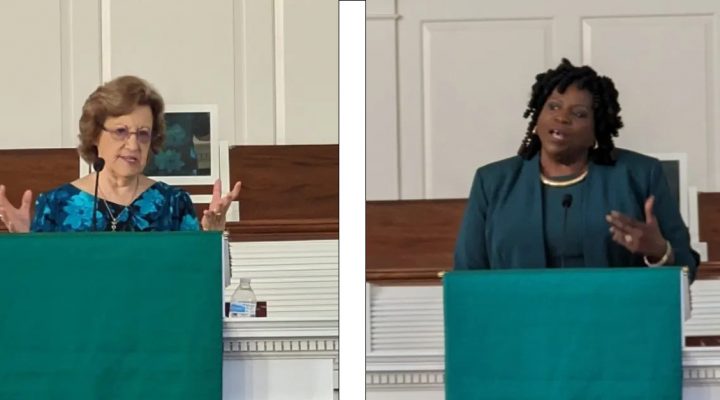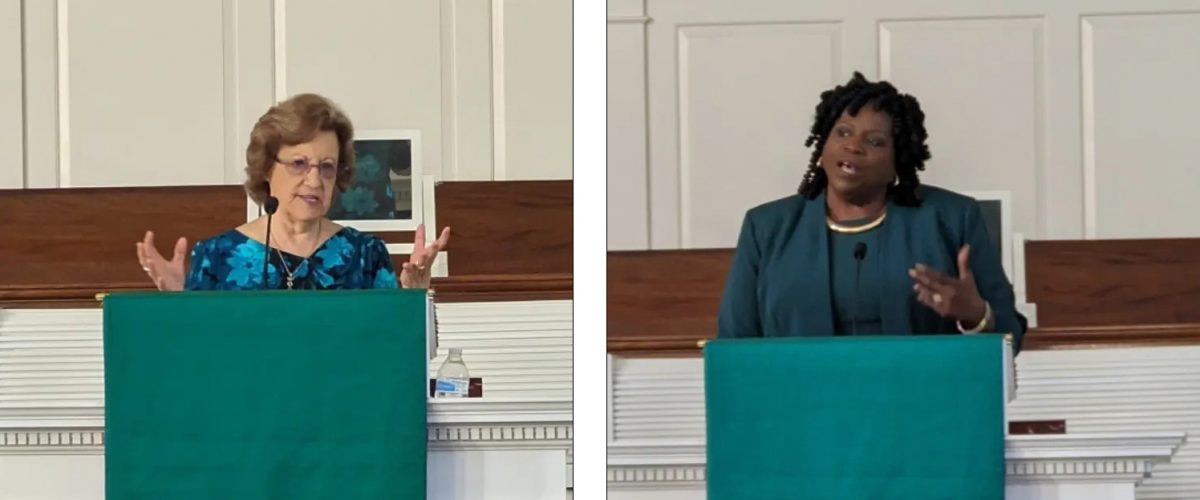In plenary addresses at the 40th anniversary gathering of Baptist Women in Ministry, two ordained Baptist women of color urged the organization to expand its horizons beyond the predominantly white constituency it traditionally has served.
Carolyn Gordon, associate professor of mass communication at Mississippi Valley State College, commended BWIM for changing its name from Southern Baptist Women in Ministry to signify its desire to serve a broader Baptist constituency. However, in her Oct. 3 address at Broadway Baptist Church in Louisville, Ky., she said the organization needs to do more to expand inclusion.
“I know you changed (the name) because you said you want to be inclusive of all Baptists, but now that you have, understand that it is not just your name,” said Gordon, who also serves as associate pastor of Mt. Gaza Missionary Baptist Church in Stringtown, Miss. “It should also be your vision.”
The struggles of Black women and white women who are serving in ministry are both the same and different, she said. “We all got scars, but they heal. They testify to what we have survived.”
“They may not see it as possible for them to be called by God to be ministers.”
Alicia Sedaca Zorzoli, a retired editor who worked at the Baptist Spanish Publishing House in El Paso, Texas, and a one-time seminary professor in Argentina, said BWIM could help identify potential women ministers of Latina descent. “They may not see it as possible for them to be called by God to be ministers,” she noted.
Latinas who are sensing a call to ministry need help to “consider it is a real thing coming from the Omnipotent,” Zorzoli said. “They have a concrete ceiling to break. It’s not a glass ceiling for them. Why? Because being a woman they have to break also with their culture, most of the time with their families.”
During their addresses, Gordon and Zorzoli, spoke about their pilgrimages to ordained ministry.
“I was raised in a church that not only did not believe in women preachers, but advocated otherwise,” Gordon said. “In fact, my pastor, whom I love dearly, who was my mentor, who was my friend, taught us that women were called to be missionaries and not called to be preachers.”
However, she said when a congregation in Texas called her as an associate pastor and sought to ordain her, her home church in Kansas City, Mo., accepted an invitation to participate in her ordination service.
Zorzoli, who sensed a call to ministry at 12, said Baptists in Argentina did not oppose her serving as a preaching professor in a Baptist seminary and a preacher in congregations. When she moved to the United States 36 years ago, the situation was much different. She found fewer preaching opportunities and encountered pay discrimination in the workplace.
“I was told women don’t preach. Women give devotionals.”
“I was told women don’t preach,” she said. “Women give devotionals.” That reality has not changed across the years, she added. “So up to now, besides my home church, in my 36 years in Texas, I am often invited to speak at churches, mostly Hispanic women’s events, but never invited to preach.”
Recognizing her gifts, her Texas congregation approached her about her ordination. “I didn’t ask for it, but they did it,” Zorzoli said.
While challenges remain formidable, both Gordon and Zorzoli pointed to encouraging signs for female ministers in their church traditions and beyond.
In 2019, Gordon was the first woman invited to speak at the Sunday School Publishing Board Conference of the National Baptist Convention, USA. Gordon said she has been on the program every year since, and this year the conference will include three female speakers.
In addition, she said the Lott Carey Foreign Mission Convention, which was founded by African American Baptists in 1890, is now led by its first female president, Gina Stewart, and a major black Baptist denomination is served by a female second vice president, Jacqueline Thompson. Thompson, senior pastor of Allen Temple Baptist Church in Oakland, Calif., in 2022 became the first woman elected to a key leadership role in the Progressive National Baptist Convention.
Zorzoli said her involvement in the Baptist World Alliance has enabled her to see women excelling in ministry around the globe as pastors and seminary professors. Despite difficult moments, she said her ministry has been rewarding. “Because those sad things can be sweetened with so many sweet things, and that’s how God works among us.”
She expressed hope that opportunities for women who are called to ministry will grow.
“The God in my Bible keeps calling and providing opportunities for his daughters to be all he planned them to be,” Zorzoli explained. “And this includes pastor, preacher, seminary professor, missionary, chaplains, any other ministries he chooses to call them to serve. I just love the God in my Bible.”
At the conclusion of her address, Gordon emphasized to the BWIM gathering that all Baptist female ministers, despite diverse backgrounds, share a common story. “And I challenge you now that you have recorded your stories, you have told your stories, that you go forth getting and collecting the other stories, which are still your stories, and understand that Baptist women in ministry are all of us. We are Baptist women in ministry.”
Related articles:
BWIM’s 40th anniversary gathering features new documentary
Experiences of female clergy are often overlooked in accounts of the SBC schism, professor says


